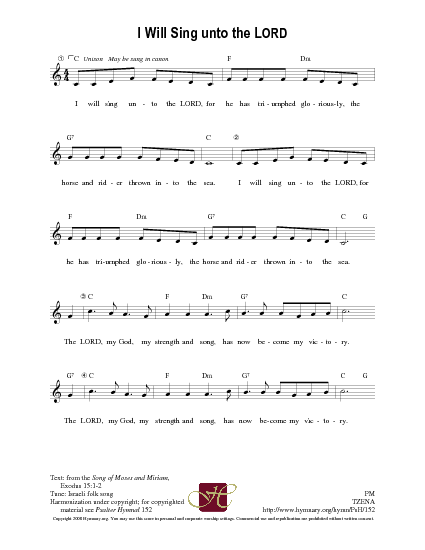- |
User Links
I Will Sing Unto the Lord

I will sing unto the Lord, For He has triumphed gloriously
Tune: TZENAPublished in 10 hymnals
Printable scores: PDF, MusicXMLAudio files: MIDI
Representative Text
I will sing unto the LORD,
for he has triumphed gloriously,
the horse and rider thrown into the sea.
I will sing unto the LORD,
for he has triumphed gloriously,
the horse and rider thrown into the sea.
The LORD, my God, my strength and song,
has now become my victory.
The LORD, my God, my strength and song,
has now become my victory.
The LORD is God, and I will praise him,
our covenant God, and I will exalt him.
The LORD is God, and I will praise him,
our covenant God, and I will exalt him.
An optional stanza for use at Easter:
I will sing unto the LORD,
for he has triumphed gloriously:
the grave is empty. Won't you come and see? Repeat
The LORD, my God, my strength and song,
has now become my victory. Repeat
The LORD is God, and I will praise him,
our covenant God, and I will exalt him. Repeat
Text Information
| First Line: | I will sing unto the Lord, For He has triumphed gloriously |
| Title: | I Will Sing Unto the Lord |
| Meter: | Irregular |
| Language: | English |
Notes
Scripture References:
st. l = Ex. 15:1-2
This triumphant text paraphrases the beginning of the Song of Moses and Miriam in Exodus 15, which was identified in the medieval church as one of the "lesser" Old Testament canticles. The song celebrates the LORD's victory over the Egyptians after the Israelites crossed the Red Sea (Sea of Reeds). Jewish tradition calls for using the Song of Moses each Sabbath evening to commemorate the Exodus. The anonymous versification (including the optional Easter stanza) dates from the mid-twentieth century.
Liturgical Use:
As a brief chorus or a canon by itself; possibly as a frame around another hymn. The Easter stanza may be sung with stanza 1 (especially during Easter Vigil), by itself, or as a frame around "Christ the Lord Is Risen Today" (388).
--Psalter Hymnal Handbook
Tune
TZENATZENA is a lively Israeli folk melody consisting of three phrases, each one repeated before the next begins. The tune title is a Hebrew verb meaning "to go forth." After singing the melody through once, proceed in four-part canon on a half-note pulse (but slower in large congregations). The keyboard…


 My Starred Hymns
My Starred Hymns

